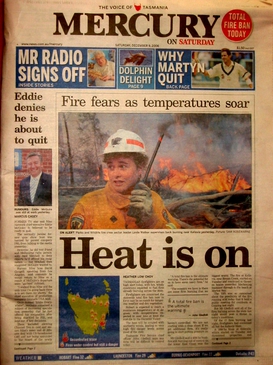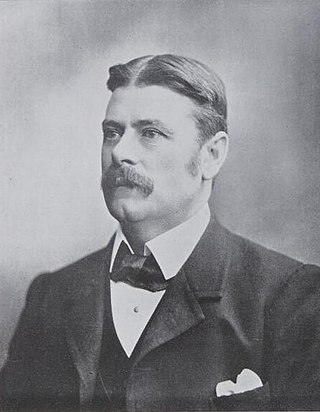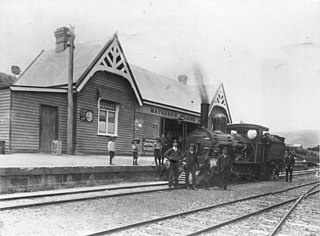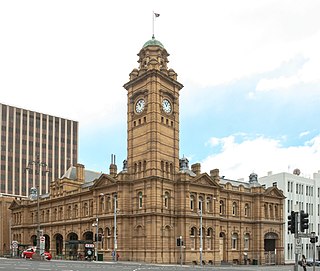Related Research Articles

Hobart is the capital and most populous city of the island state of Tasmania, Australia. Located in Tasmania's south-east on the estuary of the River Derwent, it is the southernmost capital city in Australia. Despite containing nearly half of Tasmania's population, Hobart is the least-populated Australian state capital city, and second-smallest by area after Darwin if territories are taken into account. Its skyline is dominated by the 1,271-metre (4,170 ft) kunanyi / Mount Wellington, and its harbour forms the second-deepest natural port in the world, with much of the city's waterfront consisting of reclaimed land. The metropolitan area is often referred to as Greater Hobart, to differentiate it from the City of Hobart, one of the seven local government areas that cover the city. It has a mild maritime climate.

Sullivans Cove is on the River Derwent adjacent to the Hobart City Centre in Tasmania. It was the site of initial European settlement in the area, and the location of the earlier components of the Port of Hobart.

Sir Robert Richard Torrens,, also known as Robert Richard Chute Torrens, was an Irish-born parliamentarian, writer, and land reformer. After a move to London in 1836, he became prominent in the early years of the Colony of South Australia, emigrating after being appointed to a civil service position there in 1840. He was Colonial Treasurer and Registrar-General from 1852 to 1857 and then the third Premier of South Australia for a single month in September 1857.

George Marsden Waterhouse was a Premier of South Australia from 8 October 1861 until 3 July 1863 and the seventh premier of New Zealand from 11 October 1872 to 3 March 1873.
Australian property law, or property law in Australia, are laws that regulate and prioritise the rights, interests and responsibilities of individuals in relation to "things" (property). These things are forms of "property" or "rights" to possession or ownership of an object. Property law orders or prioritises rights and classifies property as either real and tangible, such as land, or intangible, such as the right of an author to their literary works or personal but tangible, such as a book or a pencil. The scope of what constitutes a thing capable of being classified as property and when an individual or body corporate gains priority of interest over a thing has in legal scholarship been heavily debated on a philosophical level.

TheMercury is a daily newspaper, published in Hobart, Tasmania, Australia, by Davies Brothers Pty Ltd, a subsidiary of News Corp Australia, itself a subsidiary of News Corp. The weekend issues of the paper are called Mercury on Saturday and Sunday Tasmanian. The current editor of TheMercury is Craig Herbert.

Richard Bullock Andrews was an Australian politician and judge.

West Torrens is a single-member electoral district for the South Australian House of Assembly. Named after the City of West Torrens, it is a 25.1 km² suburban electorate in Adelaide's west. It includes the suburbs and areas of Brooklyn Park, Cowandilla, Flinders Park, Hilton, Hindmarsh, Keswick Terminal, Marleston, Mile End, Mile End South, Netley, Richmond, Thebarton, Torrensville, Underdale and West Richmond, as well as parts of Allenby Gardens, Lockleys, Welland and West Hindmarsh.

South Hobart Football Club is an Australian soccer club based in Hobart, Tasmania. Founded in 1910, the club currently competes in the NPL Tasmania. South Hobart plays home games at South Hobart Ground and also fields teams in all junior divisions, as well as women's teams.
The Courier is a newspaper founded in 1827 in Hobart, Tasmania, as The Hobart Town Courier. It changed its name to The Hobart Town Courier and Van Diemen's Land Advertiser in 1839, settling on The Courier in 1840.
Charles Tiffin (1833–1873) was an English architect, who spent most of his career in Queensland, Australia where he held the post of Queensland Colonial Architect.
George Leatham was an Australian politician.

John Darling Jr. was a Scottish born South Australian businessman and politician. He was a member of the South Australian House of Assembly from 1896 to 1905, representing the electorates of East Torrens (1896-1902) and Torrens (1902-1905). He was Leader of the Opposition from 1902 to 1904. After leaving politics, he was chairman of the board of directors of BHP from 1907 to 1914.
Encounter Bay was an electoral district of the House of Assembly in the Australian colony of South Australia from 1857 to 1902.
East Torrens was an electoral district of the House of Assembly in the Australian state of South Australia from 1857 to 1902 and again from 1915 to 1938.

Henry Hunter (1832–1892) was a prominent architect and civil servant in Tasmania and Queensland, Australia. He is best known for his work on churches. During his life was also at various times a state magistrate of Tasmania, a member of the Tasmanian State Board of Education, the Hobart Board of Health, a Commissioner for the New Norfolk Insane Asylum and President of the Queensland Institute of Architects.

Gretna is a rural locality in the local government areas (LGA) of Central Highlands and Derwent Valley in the Central and South-east LGA regions of Tasmania. The locality is about 20 kilometres (12 mi) south-east of the town of Hamilton. The 2016 census has a population of 211 for the state suburb of Gretna. It was formerly known as Stony Hut Plains, though the Gretna post office was known as Macquarie Plains for many years. It has a postcode of 7140.

General Post Office is a landmark building located on the corner of Elizabeth Street and Macquarie Street in Hobart, Tasmania, Australia. It stands next to the former Mercury Building and has served as the headquarters of the Tasmanian Postal system since its construction in 1905, though mail processing has now been moved to Glenorchy.
The Baker ministry was the 2nd Ministry of the Government of South Australia, led by Premier John Baker. It commenced on 21 August 1857 after Baker's allies defeated the Finniss ministry in the House of Assembly. The ministry lost a confidence vote after only two days, announced that they would resign, and adjourned parliament until the formation of the Torrens ministry on 1 September 1857. At 11 days in office, it is the third-shortest ministry in South Australian history.
The Hanson Ministry was the 4th Ministry of the Government of South Australia, led by Premier Richard Hanson. It commenced on 30 September 1857 with the defeat of the Torrens Ministry on the floor of the House of Assembly. Hanson's government was the longest lasting at this point, surviving until 9 May 1860, a total of 2 years, 222 days. It fell after losing a confidence vote, and was replaced by Thomas Reynolds' First Ministry.
References
- ↑ "Statistical Record of the Legislature, 1836-2009" (PDF). Parliament of South Australia. Retrieved 19 September 2015.
- ↑ "SOUTH AUSTRALIA". The Courier (Hobart, Tas. : 1840 - 1859) . Hobart, Tas.: National Library of Australia. 7 September 1857. p. 2. Retrieved 21 September 2015.